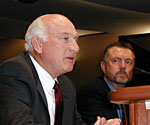By Michael Khoo
Minnesota Public Radio
November 21, 2001
|
| RealAudio |
There's more maneuvering in the debate over the Minnesota Twins. A tripartisan stadium task force held its first meeting Tuesday to discuss the future of professional sports facilities in the state. And attorneys for the Twins and Major League Baseball have prepared motions seeking a speedy ruling on their appeal to overturn an injunction that effectively blocks the threat of contraction.
| |
|
|
|
||
The 18-member task force, which was appointed jointly by the House, the Senate, and Gov. Jesse Ventura, was first proposed late last summer, well before the contraction debate heated up. But with the possibility that Twins could be cut from baseball before next season, deliberations have taken on a new urgency.
Former Twins player Kent Hrbek played during the team's two World Series championships. The Bloomington native told the panel he was stunned when he heard the team could face elimination. "It felt like a death in the family to me. It struck me as, you know, what did we all do wrong here? What happened?" Hrbek said.
According to some, what went wrong was political leaders rejected using public tax dollars to fund a new Twins ballpark. Others are clearly skeptical that a ballpark is the answer.
The task force has been asked to examine the needs of the Twins, the Minnesota Vikings, and the University of Minnesota Gophers and to recommend what - if any - public contribution is appropriate to construct new stadiums.
The task force is co-chaired by Will Haddeland, a senior advisor to Minnesota Public Radio. Dean Barkley, the director of the Minnesota Planning Department and a Ventura appointee, theorized that a ballpark might keep the team in the league, but he wondered if it would accomplish much beyond that.
"I'm struggling with what you get. I assume you'll get more revenues, the team will be more competitive. But would that mean that the scenario would be that every five or six years you can build a farm team, keep those people together - those players together - for a short period of time? They get their free agency and off they go to the big-market club," said Barkley.
The task force devoted much of its time to examining its options while the threat of contraction looms overhead.
Earlier this week, a Hennepin County judge issued a temporary injunction forcing the Twins to play next season in the Metrodome. The order effectively blocks the Twins and the league from folding the franchise. But attorneys have prepared motions asking the state Court of Appeals and the state Supreme Court to expedite their attempts to reverse that decision.
The attorneys were unavailable for comment, but in their motion they argue, in part, that if the case follows standard channels, any ruling would come too late to complete contraction plans by next season.
Andrew Shea, an attorney for the Metropolitan Sports Facilities Commission, which runs the Metrodome, told the task force that if the state Supreme Court grants the request for an accelerated review, it would be bad sign for efforts to keep the team in town.
"On the other hand, if the Supreme Court says, 'You get in line just like all of the other litigants here that have commercial disputes over contracts and damages and injunctions, and we'll take care of you in the ordinary course of business in Minnesota,' that's going to mean a lot to this case," Shea said.
Legislative efforts to block contraction are also brewing. In Congress, Sen. Paul Wellstone, D-Minn., has introduced legislation to revoke baseball's antitrust statusin issues relating to elimination or relocation of teams. An identical bill has been offered in the U.S. House by Michigan Democrat John Conyers. Hearings on the federal legislation are expected to begin in the House by early December.
The state task force is expected to meet again Nov. 29, when they'll likely delve deeper into specific stadium proposals.

